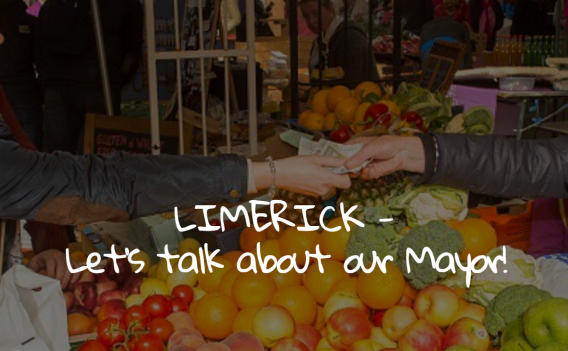Professor Maura Adshead, Head of UL Engagement and Associate Professor of Politics, reflects on UL's engagement with Limerick City and County Council to change the face of local government in Ireland
On May 24th, 2019, Limerick was the first – and so far, the only – county in Ireland to establish a directly elected Mayor with executive functions.
On foot of the result, the Minister of State for Local Government and Electoral Reform, John Paul Phelan TD, created an Implementation Advisory Group (IAG), comprised of representatives from across the social, economic and political spectrum in Limerick, to advise the Minister on how best to establish and shape the role of directly elected Mayor in Limerick.
The Group agreed that in order to ensure maximum support and buy-in for the new Mayoral role, a consultation process should be conducted to allow all stakeholders, including the citizens of Limerick City and County to contribute to the definition of a Directly Elected Mayor with Executive Functions.
In January 2020, the IAG and senior officials in the Department of Housing, Planning and Local Government, reached out to UL to see if we could help.
Arguably, my twin research interests in Irish politics and citizen engagement seemed a perfect fit for the challenge. But overall, this was a wonderful opportunity for UL too. In February, I was appointed as Head of UL Engagement and able to kick-start the new role with a creative partnership with Limerick Council, giving a perfect demonstration of how UL engagement can support Limerick innovation. As someone who is interested in demonstrating the excellent value for money that Irish Higher Education provides, this was a lovely opportunity to show the positive impact that partnering with UL can achieve.
More selfishly, what professor of politics doesn’t want to be involved in initiatives that support democratic practice and encourage people to take an interest in politics? All in all, this seemed like the perfect opportunity to demonstrate the potential for partnerships with UL.
I might have eaten my words: the pandemic was about to prove the power of partnership in ways that I had never imagined.

Our original plan for the consultation was to work with established and trusted local organisations and associations, who would share their networks, to help us to promote a series of ‘community conversations’ about the new Mayor. We would provide facilitation training and resources to encourage and record the participation, and in doing so enable a series of locally hosted consultations across the county.
Using this common approach, we would gather all the feedback into a peoples’ report on the new mayoral role. The report needed to be completed by the summer if it was to be considered in subsequent legislation establishing the position.
Essentially, the timeframe for our consultation coincided exactly with the outbreak of COVID-19 and all the restrictions that this entailed. Rather than abandon the consultation process, we were challenged to re-imagine and re-configure it for a move online in lockdown.
Writing this piece in week two of the UL term, I think it’s safe to say that we now all know that the cliché is a truism: the impossible we do at once – it’s only the miracles that take a little longer! My summer crash course in online facilitation only foreshadowed what every lecturer and tutor is now doing as a matter of course in UL.
And for this reason, it would be ridiculous to boast about all the things I’ve learned to do online. What I would like to crow about, is the wonderful support that I received throughout the summer from colleagues inside and outside UL and from community partners old and new. I never once contacted anyone for help without receiving an immediate and positive response.
Because of the extremely tight timeframe for consultation—and the constraints of working in COVID-19 isolation, our design team was small and comprised of existing collaborative partners who had all worked together before on various community engaged initiatives. In addition to the UL engagement team and VPAASE office, we were supported by UL’s K4C mentors*; Limerick Youth Services; the Limerick Public Participation Network; and our collaborative partners in SME, e-Townz.
Together, we built a website, designed explanatory videos and cartoons, and created survey materials for use online and offline.
We hosted 21 facilitated community conversations online ourselves and provided the resources and toolkits for groups to host their own conversation with family or friends. In total 927 people from Limerick city and county participated, providing a robust evidence base for the report that we delivered to the IAG and Department of Housing, Planning and Local Government.
You can find it all on the Limerick Council website: ourmayor.limerick.ie
I’m still stuck in the attic and I can’t lie, I’m getting a bit fed up with it now. But I know I’m not alone. I work with the best of colleagues from all across the university. UL Engagement is not about one programme or project or initiative, it’s about a culture and ethos of collaboration and commitment.
The Limerick Mayor project showed me how much we can do – even from an attic. I don’t doubt, that in spite of COVID-19, we’ll all do a whole lot more before this virus is done with us.
- Professor Maura Adshead
*The ’Knowledge for Change’ (K4C) network is a UNESCO sponsored global network of K4C trained Community Based Participatory Researchers. In 2019, UL was designated as the only UNESCO K4C hub in Ireland.
